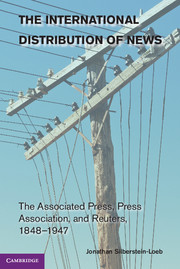 The International Distribution of News
The International Distribution of News Book contents
- Frontmatter
- Dedication
- Contents
- List of Tables
- Acknowledgments
- 1 Introduction
- 2 Conceiving Cooperation among American Newspapers, 1848–1892
- 3 Cooperation, Competition, and Regulation in the United States, 1893–1945
- 4 The “Rationalist Illusion,” the Post Office, and the Press, 1868–1913
- 5 Private Enterprise, Public Monopoly, and the Preservation of Cooperation in Britain, 1914–1941
- 6 Reluctant Imperialist? Reuters in the British Empire, 1851–1947
- 7 Cartel or Free Trade: Supplying the World’s News, 1856–1947
- 8 Conclusion
- Bibliography
- Index
- References
4 - The “Rationalist Illusion,” the Post Office, and the Press, 1868–1913
Published online by Cambridge University Press: 05 July 2014
- Frontmatter
- Dedication
- Contents
- List of Tables
- Acknowledgments
- 1 Introduction
- 2 Conceiving Cooperation among American Newspapers, 1848–1892
- 3 Cooperation, Competition, and Regulation in the United States, 1893–1945
- 4 The “Rationalist Illusion,” the Post Office, and the Press, 1868–1913
- 5 Private Enterprise, Public Monopoly, and the Preservation of Cooperation in Britain, 1914–1941
- 6 Reluctant Imperialist? Reuters in the British Empire, 1851–1947
- 7 Cartel or Free Trade: Supplying the World’s News, 1856–1947
- 8 Conclusion
- Bibliography
- Index
- References
Summary
The American state regulated news associations through competition policy to protect newspaper plurality. In Britain, the state also sought to protect plurality but it did so through telecommunications policy. By nationalizing telegraphy, Parliament sought to create and maintain a level playing field for competition among provincial publishers while subsidizing their newsgathering collectively. These policies, the intellectual origins of which may be traced to the Enlightenment, continued until World War I.
Government control of telegraphy delayed vertical and horizontal integration and encouraged the perpetuation of several specialized newsgathering organizations which were loosely combined through various agreements. In this way, the structure of the newsgathering market in Britain was similar to that of British manufacturing. If America was the land of the trust, then Britain was the land of the gentlemen’s agreement; but whereas the attempts of small firms to limit competition in large markets through agreement during the nineteenth century were often ineffective, the influence of government policy ensured that those among news organizations worked.
- Type
- Chapter
- Information
- The International Distribution of NewsThe Associated Press, Press Association, and Reuters, 1848–1947, pp. 88 - 124Publisher: Cambridge University PressPrint publication year: 2014


